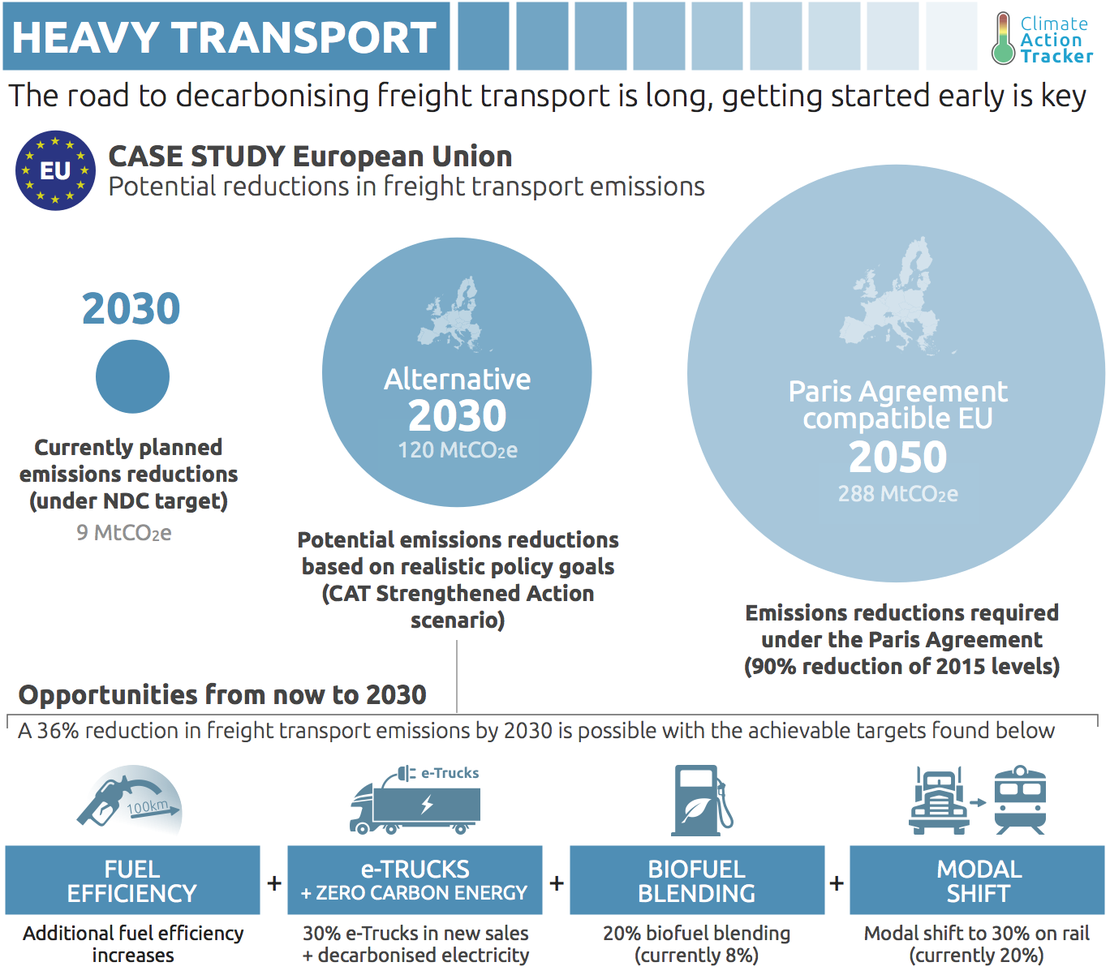The highway to Paris: Safeguarding the climate by decarbonising freight transport
Attachments
Summary
Despite its significant contribution to global warming, the road freight transport sector is often neglected in government policies, according to the Climate Action Tracker’s (CAT) latest memo in its decarbonisation series.
The memo was released as Ministers from over 80 countries gather in Leipzig, Germany, for the International Transport Forum where decarbonising the freight transport sector is on the agenda.
The analysis includes a specific EU case study (see below), which shows huge potential for the EU to reduce heavy road vehicle emissions. The EU Commission’s new proposal for reducing CO2 emissions in new trucks is not yet Paris Agreement-compatible, although a step in the right direction.
About 40% of well-to-wheel CO2 emissions from the global transport sector were attributed to freight transport in 2014. Heavy road transport activity is expected to increase about threefold from 2010 levels by 2050—unless governments introduce policies to reduce this.
“There are a large range of technological options for zero emissions freight including electric and renewable based fuel cell powered trucks, but governments need to move quickly to address challenges to ensure they are introduced fast enough to reduce emissions from heavy road transport to Paris Agreement compatible levels,” said Bill Hare, of Climate Analytics.
The analysis shows that full decarbonisation of global freight emissions should be targeted to around 2050 to meet the Paris Agreement goals. For the EU this means that freight emissions should be reduced by at least 30% below 2015 levels by 2030, with full decarbonisation of overland freight by around 2050. Decarbonising transport will produce large health and energy security benefits including air quality improvements, electricity grid balancing, electricity storage, and economic benefits including reduced fuel import costs.
To achieve the Paris Agreement’s long term goal, rapid deployment of technologies that allow full decarbonisation are key, such as electrification, green hydrogen or synthetic fuels.
“It is important to bear in mind that, to be truly zero-carbon, green hydrogen fuel cell or battery powered electric trucks will need to rely on a decarbonised electricity system—this reinforces the need for a carbon-free power sector by 2050,” said Yvonne Deng, of Ecofys, a Navigant company.
To achieve a Paris Agreement compatible emissions level for heavy vehicles will also require sustainable biofuel blending, energy efficiency and demand reduction as well as contributions from modal shift from road freight towards railroads and ships. Only four countries—Canada, China, Japan and the United States—have introduced efficiency standards for heavy-duty freight vehicles that would encourage a switch. Others will need to follow.
The CAT ‘road freight’ memo warns that while biofuels have a role, they need to be developed in a way that ensures their long-term sustainability and carbon neutrality.
“Biofuels can and need to be produced sustainably to avoid a situation where unsustainable biofuel projects threaten food security, and exacerbate other social and environmental impacts,” said Takeshi Kuramochi of NewClimate Institute.
Developments around the world are promising and may happen much faster than expected: In the US an innovative renewable-based fuel cell truck technology has been launched. Manufacturer Nikola reports to have 9,000 advance orders and plans to couple deployment with the rollout of renewable hydrogen based refuelling stations. The technology has been picked up by major brewing company Anheuser-Busch as part of its push towards a renewable energy based brewing and delivery system by 2025.
Case study
The European Union
We find that heavy road emissions in the EU28 could be reduced by up to 90% below 2015 levels by mid-century. This could be achieved by a policy package of support for fast uptake of e-trucks (30% of new sales by 2030), combined with a 90% share of zero emissions electricity and short-term measures of introducing ambitious fuel efficiency standards for trucks, as well as incentives for shifting from road to rail and an increase in sustainable biofuel blending. To achieve this, existing EU policies must be strengthened and additional policies introduced. The recent EU Commission’s proposal—aiming at reducing the average CO2 emissions from new trucks by at least 30% by 2030 below 2019 levels—is a first step in the right direction although not yet in line with what is needed for the Paris Agreement.

Decarbonisation memo series

This memo is a part of the CAT decarbonisation memo series that seeks to address the question: How can different sectors achieve the rapid transformations and emissions reductions required to meet the long-term temperature goals of the Paris Agreement? Click on the link below to read more about the series or click on the icons to see the analysis for each sector.
Stay informed
Subscribe to our newsletter